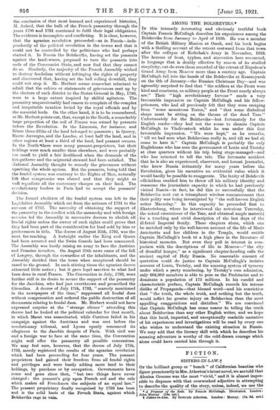AMONG THE BOLSHEVIKS.* hr this intensely interesting and obviously truthful
book Captain Francis McCullagh describes his experiences among the Bolsheviks from January to April of 1920. He was a member of the British Military Mission at Omsk, and his book begins with a thrilling account of the retreat eastward from that town after the collapse of Koltchak's Army in November, 1919.
The horrors of frost, typhus, and starvation here recounted, in language that is doubly effective by reason of its studied simplicity, out-do even those recorded of the retreat of Napoleon's Grand Army from Moscow more than a century ago. Captain McCullagh-fell into the hands of the Bolsheviks at Krasnoyarsk on the 6th of January—the Russian Christmas Day—and was agreeably surprised to find that " the soldiers at the Front were kind and courteous, as military people at the Front nearly always are." Their " high revolutionary fervour " made a very favourable impression on Captain McCullagh and his fellow- prisoners, who had all previously felt that they were escaping from " some monstrous Terror," and " that some diabolical shape must be sitting on the throne of the dead Tsar."
Unfortunately for the Bolsheviks—but fortunately for the English reader—they had not the sense to dismiss Captain McCullagh to Vladivostock whilst he was under this first
favourable impression. " We were kept," as he remarks, " till we had seen what Bolshevism really is, and till we had all come to hate it." Captain McCullagh is probably the only Englishman who has seen the government of Lenin and Trotsky at close quarters without his trip being stage-managed—and who has returned to tell the tale. The fortunate accident that he is also an experienced, observant, and honest journalist, who knew Russia intimately for many years before the Revolution, gives his narrative an evidential value which it would hardly be possible to exaggerate. The laxity of Bolshevik officialdom enabled him to throw off his military identity and reassume the journalistic capacity in which he had previously visited Russia—in fact, he did this so successfully that the Bolsheviks sent cut a triumphant wireless announcement that their polity was being investigated by " the well-losown English writer Macaulay." In this capacity he proceeded first to Ekaterinburg, where he interviewed the notorious Yurovsky, the actual executioner of the Tsar, and obtained ample material for a touching and vivid description of the last days of tha ill-fated Imperial family. These chapters alone, which can be matched only by the well-known account of the life of Marie Antoinette and her children in the Temple, would entitle Captain McCullagh's book to a high place in the literature of historical memoirs. But even they pall in interest in com- parison with the descriptions of life in Moscow—" the city of dreadful hunger," as a significant chapter-heading calls the ancient capital of Holy Russia. No reasonable amount of quotation could do justice to Captain McCullagh's incisive account of Lenin, Trotsky, and the amazing system of tyranny under which a party numbering, by Trotsky's own admission, only 604,000 members is able to pose as the Proletariat and to dominate a population of 175 millions. In his candid and characteristic preface, Captain McCullagh records his intense dislike of Propaganda—that blessed word—and his conviction that " the truth, the whole truth, and nothing but the truth, would inflict far greater injury on Bolshevism than the most appalling exaggerations and diatribes." We are convinced that Captain McCullagh has oome nearer to telling the truth• about Bolshevism than any other English writer, and we hope that this lucid, impartial, and exceptionally readable narrative of his experiences and investigations will be read by every one who wishes to understand the existing situation in Russia. We may add that the literary skill with which he describes his amazing adventure is worthy of the cold-drawn courage which alone could have carried him through it.


































 Previous page
Previous page